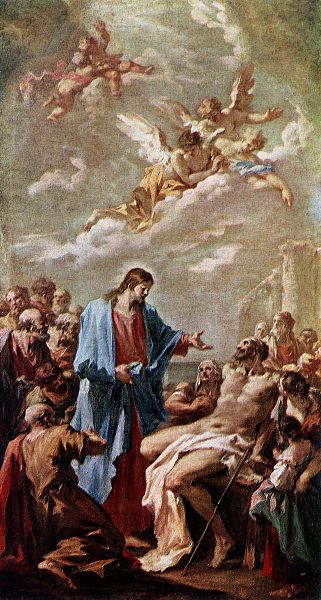Luke 5 – The Nazarene’s Commentary: Luke 5:17-26 – Who Can Forgive Sins?
Luke 5:17-26 – Who Can Forgive Sins?
|| Matthew 9:1-8;[1] Mark 2:1-12[2]
LK5:17 Now it occurred during those days when Jesus was teaching some Pharisees and teachers of the Law were sitting around – for they had arrived from every village in Galilee and Judea, including Jerusalem – and YHWH’s power was with him to heal.[3] LK5:18 And, look, men approached carrying a paralyzed person on a pallet and they sought a way to place him before Jesus. LK5:19 When they could not find a way to carry him through the crowds they went on to the roof and through the tiles they lowered him on the pallet among them right in front of Jesus. LK5:20 Now when Jesus observed their faith, he said: “Man, your sins are forgiven you.” LK5:21 Then the Bible Copyists[4] and Pharisees began to discuss this among themselves: “Who is this person to speak such blasphemies? Who is able to forgive sins except The God Himself?”[5] LK5:22 When Jesus realized their thinking he responded to them: “Why do you reason this way in your hearts? LK5:23 Which is easier to say? ‘Your sins have been forgiven,’ or, ‘Get up and walk.’ LK5:24 However, so that you will realize that the ‘Son of Humankind’[6] [Daniel 7:13] has authority on earth to forgive sins[7] – Jesus said to the paralyzed man – I tell you: rise, pick up your pallet, and return to your house.” LK5:25 And instantly the man rose before them all, picked up the pallet upon which he lay, and departed to his house giving glory to The God. LK5:26 So the crowd was overcome in ecstasy[8] and they also began to glorify The God, and filled with fear they said: “We have seen strange things[9] this day!”
[1] Matthew 9:1-8: For details see notes in Nazarene Commentary 2000 on Matthew.
[2] Mark 2:1-12: For details see notes in Nazarene Commentary 2000 on Mark.
[3] YHWH’s power was with him to heal: Or, the power of the Lord was present to heal them. The Greek is DYNAMIS KYRIOU [power of Lord]. The “Lord” here is The God of Jesus. The Nazarene’s power to heal did not originate from himself but from his Father.
[4] Bible Copyists: Or, scribes, Bible scholars. The Greek is GRAMMATEIS, the Hebrew Sopherim. They were also teachers and highly respected. They also acted as public notaries or secretaries.
[5] Who is able to forgive sins except The God Himself: Or, but God alone. This is a Jewish assertion and not to be used as an argument that Jesus was actually God. In these accounts the Nazarene states that he has received such authority from God, and the crowds draw this same conclusion. That others may receive such authority is seen at John 20:23.
[6] Son of Humankind: This is the first occurrence of two dozen of the designation drawn from Daniel 7:13.
[7] The Son of Humankind has authority on earth to forgive sins: Jesus uses the designation “Son of Man” as a general title for himself as Messiah. However, he also uses the name for himself before he experienced a human birth. Note John 6:62. The language here could be understood to refer to his pre-existence. For details see notes in Nazarene Commentary 2000 on the subject pre-existence in the gospel of John as well as in Biblical Articles.
[8] Ecstasy: Or, amazed, astonished, dumbfounded. The Greek is ECSTASIS.
[9] Strange things: Or, wonders, unaccountable things, marvelous things, incredible. The Greek is PARADOXA.
+
Preceding









 Bijbelvorsers Webs
Bijbelvorsers Webs Belgische Vrije Christadelphians / Belgian Free Christadelphians – Old Google Main Website
Belgische Vrije Christadelphians / Belgian Free Christadelphians – Old Google Main Website Christadelphian Ecclesia
Christadelphian Ecclesia Hoop tot Leven – Redding in Christus
Hoop tot Leven – Redding in Christus
Recent Comments